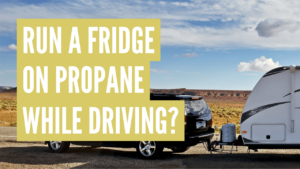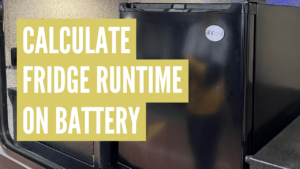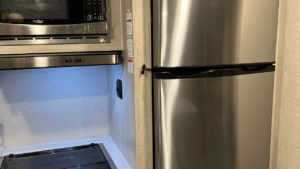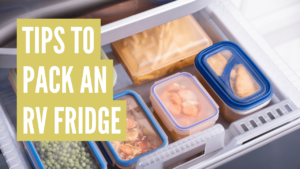Keeping your RV fridge cold is important when traveling with perishable food. But will your battery power the fridge while you’re driving?
Below we explore if your RV battery is set up to run your fridge while driving, alternatives to battery power, and tips to keep your food cool on the road.
Can You Run an RV Fridge on Battery While Driving?
You can run an RV fridge on battery power while driving if you have a 12-volt DC fridge or a 120-volt AC fridge with an inverter. This allows you to maintain the temperature of your refrigerator without relying on propane gas or generators.
How you run your RV fridge on battery will depend on the type of fridge you have.
Absorption Fridges
Absorption fridges operate using a heat-driven process and come in two main types: Two-Way and Three-Way.
Two-Way Fridges
Two-way fridges run on AC (shore power) or propane gas. A power inverter can convert 12V DC from the batteries to 120V AC, allowing the fridge to run on battery power while driving.
Important: Running on propane is also common, but it’s important to follow safety guidelines and local regulations (i.e., turn it off when refueling and traveling through marked tunnels).
Three-Way Fridges
Three-way fridges can operate on AC (shore power), DC (battery power), and LP gas (propane). When driving, you can switch to 12V DC mode, using the vehicle’s alternator to charge the batteries and power the fridge.
Compressor Fridges
Compressor fridges are becoming increasingly popular in modern RVs and motorhomes. They use a compressor to circulate refrigerant, removing heat from the inside and maintaining a consistent temperature. They run off either 12V DC or 120V AC.
Compressor fridges are more energy-efficient, consuming fewer amps, which helps extend battery life. They can easily run on battery power by plugging into the vehicle’s power system or using an inverter to convert 12V DC to 120V AC.
While efficient, compressor fridges may be more expensive and produce more noise than absorption fridges.
Important: If you have a towable RV, keep the house battery charged while driving through the tow vehicle’s alternator with a 7-pin travel trailer plug.
Alternatives to Battery Power While Driving
Running an RV fridge on battery power while driving is common, but you might need an alternative power source for various reasons, such as conserving battery life or using more efficient energy sources.
Using Propane Gas
Propane gas is a widely used alternative to battery power for running an RV fridge, especially in absorption fridges designed to operate on LP gas.
- Efficiency: Often more energy-efficient than running on battery power.
- Availability: Propane is widely available at gas stations and RV supply stores.
- Safety Considerations: Proper ventilation is essential to prevent any buildup of gas. Be aware of local regulations regarding the use of propane while driving, and always follow the manufacturer’s guidelines for safe operation.
See Can I Run My RV Fridge on Propane While Driving? for important safety considerations.
Using an Onboard Generator
If your RV is equipped with an onboard generator, it can power the fridge while driving.
- Compatibility: Ensure that the onboard generator meets the fridge’s wattage requirements. It should be able to handle it unless you’ve upgraded the fridge.
- Monitoring: Keep an eye on any warning indicators and ensure the generator is running smoothly.
- Safety Considerations: Never use a portable gas-powered generator inside the RV, as it can release deadly carbon monoxide.
Preparing Your RV Fridge for a Trip
Preparing your RV fridge for a trip helps keep it within an ideal temperature range and your food safe. Here’s how to get your RV fridge ready:
1. Pre-Cooling the Fridge
Start cooling the fridge at least 24 hours before leaving on your trip. If possible, use shore power to pre-cool, as it conserves battery and propane. Aim for a temperature between 34°F and 40°F (1°C to 4°C).
2. Packing the Fridge
When packing the fridge, place already chilled or frozen items inside. Avoid overpacking to allow space for air to circulate, and use containers or fridge organizers to prevent items from shifting while driving.
3. Monitoring Battery and Propane Levels
Ensure that batteries are fully charged if planning to use battery power, and inspect propane levels if you intend to use propane. Adequate preparation will prevent unexpected power loss.
4. Safety Checks
Regularly inspect the door seals for any damage or wear, and ensure proper ventilation if using propane. Also, test any propane or carbon monoxide alarms to ensure they function correctly.
5. Temperature Monitoring
Consider installing a thermometer to monitor the temperature during the trip, and be prepared to adjust the temperature settings based on the outside temperature and load.
Tip: Check out our guide on keeping an RV fridge cold while driving for more tips!
FAQs
Can I Run Other Appliances Along with the Fridge on Battery Power While Driving?
Yes, running other appliances along with the fridge on battery power while driving is possible, but it requires careful planning and understanding of your RV’s electrical system. The total energy consumption of all appliances, including the fridge, must be within the capacity of your RV’s battery system.
The efficiency of the appliances, the size and condition of the batteries, and the presence of additional charging sources like solar panels or an alternator will all influence the ability to run multiple appliances. It’s essential to know each appliance’s wattage and amp hours and monitor the battery’s state of charge to prevent depletion.
How Long Will My RV Fridge Run Off Battery While Driving?
How long an RV fridge will run off the battery while driving varies widely based on several factors. These include the size and condition of the battery, the energy consumption rate of the fridge, and whether other appliances are also drawing power. On average, a fully charged 12V battery might power an RV fridge for 4 to 6 hours, but this can differ significantly based on the specific circumstances.
Related: How Long Will an RV Fridge Run on Battery?
Is It Safe to Run My RV Fridge on Propane While Driving?
Running an RV fridge on propane while driving is a common practice and is generally considered safe when done correctly. However, it requires adherence to specific safety guidelines and awareness of potential risks.
Proper ventilation is extremely important to prevent any gas buildup, and the propane system should be regularly inspected for leaks or damage. Some regions may have laws or regulations regarding the use of propane while driving through tunnels and bridges,
Additionally, it’s a good practice to turn off the propane-powered appliances while refueling the RV to minimize any risk of ignition. Following the manufacturer’s guidelines and considering any specific recommendations for your RV model will provide the best guidance for safely using propane to power your fridge while on the road.







Write a comment